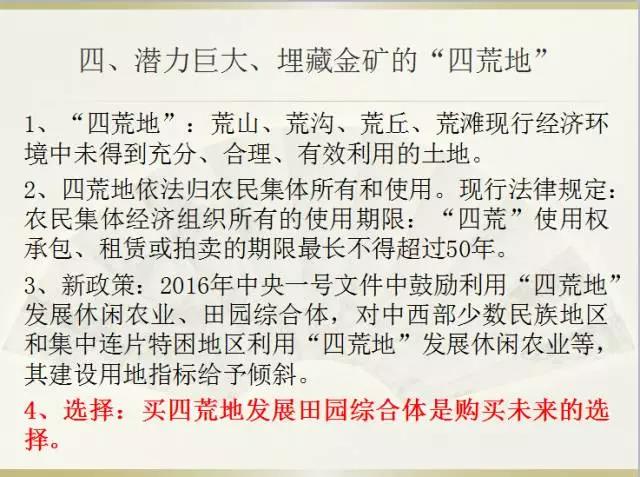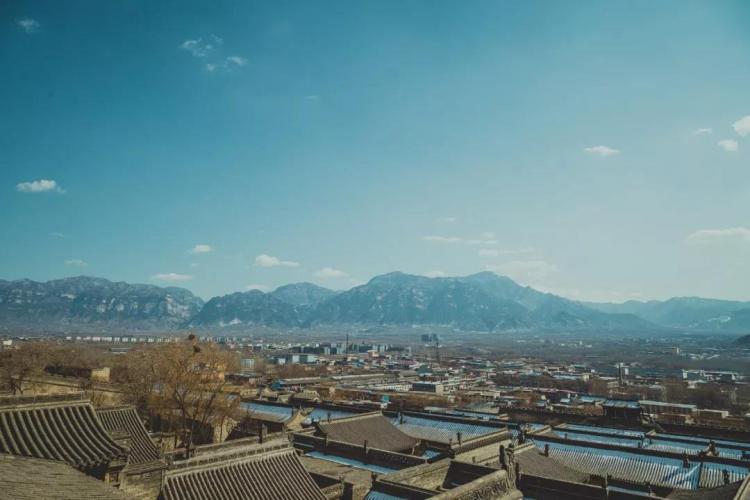1. Characteristics of pastoral complexes
In terms of concept and model, the pastoral complex is a comprehensive complex of resource integration, circular agriculture, creative agriculture, and farming experience-based integration of primary, secondary, and tertiary industries, as well as “tourism +”. It is characterized by the deep integration of foreign capital, that is, urban capital and local “three rural” elements.
The pastoral complex is very different from the characteristic town. The pastoral complex is a typical “agriculture +” project. As far as agriculture is greatly affected by natural conditions, it is a weak industry. Because it is related to agriculture, including characteristic towns, the Central Committee of the Communist Party of China has not issued a document. The pastoral complex is a document of the Central Committee of the Communist Party of China, and it is the No. 1 document of the Central Committee. Because the policies related to agriculture are supported and preferential, and taxes are to be reduced or exempted .

2. Weaknesses in the development of pastoral complexes
First, it is an imported product, including the integration of tertiary industries, experience, and creativity are all borrowed from Japan, Taiwan, Europe, and the United States, but combined with the reality of our country.
Second, our current stage of development is different from that of foreign countries. Urbanization in Japan, Taiwan, Europe, and the United States has been completed and is the product of counter-urbanization, while our country is in the process of rapid urbanization.
Third, we are now facing some restrictions: first, there are structural and institutional obstacles to the transfer of urban resources to the countryside; Industrial talents are very important. The new economy must follow talents. There are no talents in rural areas. This is a very huge shortcoming we have encountered.

New policies and rural land reform create conditions for the development of pastoral complexes
If there are no existing new policies, rural land reform, and reform of the collective property rights system, the pastoral complex will definitely not be possible. In addition to studying the market, it is necessary to study policies in order to engage in pastoral complexes.
1. There are institutional obstacles for urban capital to go to the countryside to buy houses, land, mountains and ponds
At present, various factors of production in cities have been commercialized. Rural resources belong to collective property and are non-market-oriented, including houses with small property rights. The same houses are not protected by law. There are currently institutional obstacles for urban capital to enter the countryside to build rural complexes.
2. New policy: promoting the marketization of rural factor resources
Many of the corresponding reforms in the countryside are documents of the Central Committee of the Communist Party of China. The entire policy orientation is to promote the marketization of rural factor resources.
3. Policy orientation: Encourage and support urban capital talents to go to the countryside
Support returnees and encourage wasteland and abandoned brick and tile kilns to use the vacant land to start a business.
4. Activate rural resources, capitalize and realize market value
Through confirmation of rights, shares, determination of value, tradability, and convertibility, a basic condition has been created for urban capital to enter, without which it is illegal.
5. The reform of the rural collective property rights system creates conditions for urban capital to go to the countryside to develop pastoral complexes
First, the reform of the rural collective property rights system is a prerequisite for promoting the marketization of rural resources; second, only after the reform of the collective property rights system turns dead resources in rural areas into living resources can equal exchange and market allocation be possible; third, many infrastructures in rural areas, including All farmland infrastructure uses PPP; Fourth, the necessary conditions have been created for capital to go to the countryside to build rural complexes.

In the reform of rural collective assets, which type of land is suitable for pastoral complexes
1. New policies: from the separation of powers to the reform of collective property rights
The central government has promulgated the “Reform of the Three Full Division System” and “Reform of the Shareholding System of Collective Assets”. The reform will create conditions for transactions after the property rights of forests, ponds, wasteland, etc. belonging to collective assets are transferred to the individual, which is a major factor in the marketization of rural resource market elements. breakthrough.
2. Rural collective assets: the material basis of pastoral complexes
Pastoral complexes are inseparable from three categories: natural, resource-based; operating assets; non-operating assets.
3. Which land can be used as pastoral complex land
First, farmers’ own houses are limited to homesteads; second, rural collective construction land.
4. “Four wastelands” with huge potential and buried gold mines
It is recommended that everyone pay close attention to the four wastelands, which is the best field for us to carry out the pastoral complex in the next step. The auction of the four wastelands has been liberalized since 1998. For the sake of poverty alleviation and ecology, the earliest auctions of the four wastelands were in Gansu, Ningxia, Shanxi, and Shaanxi.
5. Use the policy of “linking the increase and decrease of urban and rural construction land” to solve the land demand
The National Development and Reform Commission and the Ministry of Agriculture issued a policy document on the implementation of the PPP model in the agricultural sector. Among the 20 projects, 2 are land consolidation projects. Land consolidation can also make money, and it can also be very professional. After land consolidation, one can build a Pastoral complexes, this one in particular has charm.


Pastoral Complex: Preventing Policy Risks in Land Use
1. What are the restrictions on the use of basic farmland
1. Farmland is divided into basic farmland and non-basic and general farmland. Basic farmland is approved by the State Council;
2. Do not go beyond land use planning;
3. Land use control is the basic principle of the country;
4. The indicators linked to urban construction land have to exchange bad land for good land, and basic farmland must not be replaced.
2. Some policy restrictions on agricultural land
1. It is strictly forbidden to arbitrarily expand the scope of agricultural land for facilities;
2. Leisure and sightseeing spots based on agriculture are managed according to construction land, and the taxation is different;
3. It must be managed according to the law and regulations according to the construction land, not according to the management of the agricultural land;
4. Land use, all land use conversions must be paid;
5. Accounting for balance.
3. The small trick of using policy flexibility space is not sustainable, and how to go on a journey to get land can be guaranteed
We suggest to apply for construction land through formal channels for project approval, although there are many conditions. But don’t be opportunistic, take advantage of loopholes, and be careful not to reap the consequences.


Tap the dividends of land reform and solve land problems
1. Take advantage of the dividends of land reform, innovate cooperation methods and explore new methods of land use for pastoral complexes
First, the land bank model; second, the land shareholding cooperative model.
2. Take advantage of land reform dividends, innovate cooperation models, and explore new land use methods for pastoral complexes
3. Farmers quit and companies buy land from farmers
The big problem with urbanization now is that farmers cannot withdraw, and there is no mechanism for paid withdrawal.
Source: Pastoral Complex Research Institute




